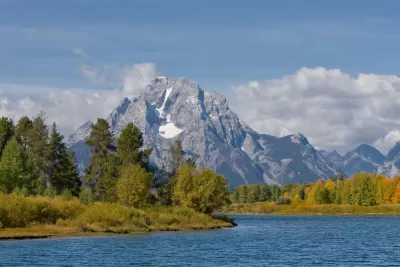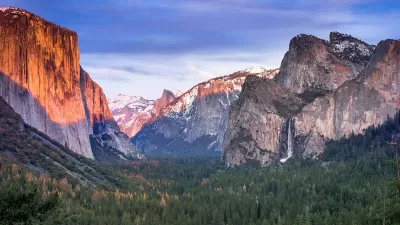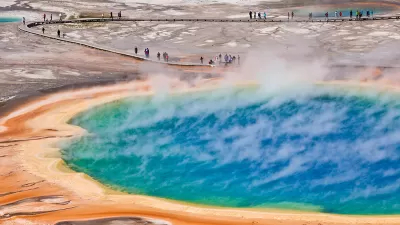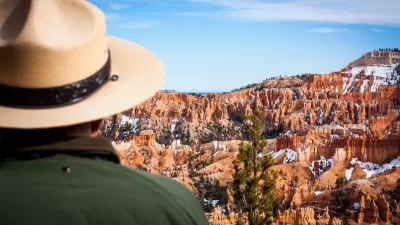With the Trump administration's support, private industry is busy building new broadband infrastructure on public lands. The effect is already obvious in many national parks.

Jimmy Tobias reports on the proliferation of telecommunications infrastructure in public lands, a consequence of policy and philosophy changes enacted by the Trump administration.
In fact, [the National Park Service] is presently pursuing a massive expansion of cellular and broadband facilities at Grand Teton National Park. Working in tandem with major telecom companies like AT&T and its agents, the agency is planning to permit the installation of more than 60 miles of fiber-optic cable, as well as at least nine new cell tower sites scattered throughout the park. The plan, which is awaiting a final permit, would blanket much of Grand Teton with new and stronger coverage. It is shaping up to be the largest single expansion of telecommunications infrastructure in national park history.
Supporters of expanded cell service in national parks point to the potential support such technology could provide for search and rescue missions, as well as the large demand for cell service among the general public. Others point to the need for places where people can still unplug from technology and social media.
Grand Teton National Park is really just a testing ground, however, for a wider deployment of telecom infrastructure in public lands."The telecom giants — AT&T, Verizon and more — are pushing to build out infrastructure on protected public lands across the country," according to Tobias, "[a]nd they have found a close collaborator in the federal government, which is working alongside industry operatives to open many national parks and other public lands to commercial wireless service."
Specifically, according to Tobias, "President Donald Trump’s Federal Communications Commission has limited the authority of local governments to stop such development." Also, "The administration is also working to 'streamline' environmental reviews and speed up the permitting process that lets companies build telecom facilities on federal land."
FULL STORY: The Park Service is selling out to telecom giants

Planetizen Federal Action Tracker
A weekly monitor of how Trump’s orders and actions are impacting planners and planning in America.

Restaurant Patios Were a Pandemic Win — Why Were They so Hard to Keep?
Social distancing requirements and changes in travel patterns prompted cities to pilot new uses for street and sidewalk space. Then it got complicated.

Map: Where Senate Republicans Want to Sell Your Public Lands
For public land advocates, the Senate Republicans’ proposal to sell millions of acres of public land in the West is “the biggest fight of their careers.”

Maui's Vacation Rental Debate Turns Ugly
Verbal attacks, misinformation campaigns and fistfights plague a high-stakes debate to convert thousands of vacation rentals into long-term housing.

San Francisco Suspends Traffic Calming Amidst Record Deaths
Citing “a challenging fiscal landscape,” the city will cease the program on the heels of 42 traffic deaths, including 24 pedestrians.

California Homeless Arrests, Citations Spike After Ruling
An investigation reveals that anti-homeless actions increased up to 500% after Grants Pass v. Johnson — even in cities claiming no policy change.
Urban Design for Planners 1: Software Tools
This six-course series explores essential urban design concepts using open source software and equips planners with the tools they need to participate fully in the urban design process.
Planning for Universal Design
Learn the tools for implementing Universal Design in planning regulations.
Heyer Gruel & Associates PA
JM Goldson LLC
Custer County Colorado
City of Camden Redevelopment Agency
City of Astoria
Transportation Research & Education Center (TREC) at Portland State University
Camden Redevelopment Agency
City of Claremont
Municipality of Princeton (NJ)





























